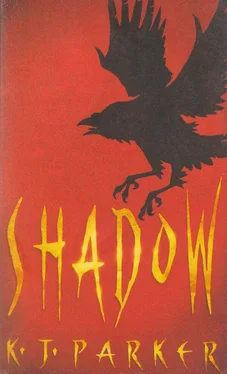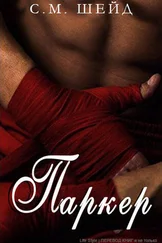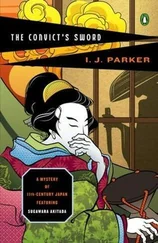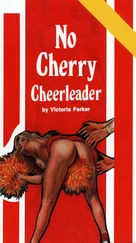K Parker - Shadow
Здесь есть возможность читать онлайн «K Parker - Shadow» весь текст электронной книги совершенно бесплатно (целиком полную версию без сокращений). В некоторых случаях можно слушать аудио, скачать через торрент в формате fb2 и присутствует краткое содержание. Жанр: Фэнтези, на английском языке. Описание произведения, (предисловие) а так же отзывы посетителей доступны на портале библиотеки ЛибКат.
- Название:Shadow
- Автор:
- Жанр:
- Год:неизвестен
- ISBN:нет данных
- Рейтинг книги:3 / 5. Голосов: 1
-
Избранное:Добавить в избранное
- Отзывы:
-
Ваша оценка:
- 60
- 1
- 2
- 3
- 4
- 5
Shadow: краткое содержание, описание и аннотация
Предлагаем к чтению аннотацию, описание, краткое содержание или предисловие (зависит от того, что написал сам автор книги «Shadow»). Если вы не нашли необходимую информацию о книге — напишите в комментариях, мы постараемся отыскать её.
Shadow — читать онлайн бесплатно полную книгу (весь текст) целиком
Ниже представлен текст книги, разбитый по страницам. Система сохранения места последней прочитанной страницы, позволяет с удобством читать онлайн бесплатно книгу «Shadow», без необходимости каждый раз заново искать на чём Вы остановились. Поставьте закладку, и сможете в любой момент перейти на страницу, на которой закончили чтение.
Интервал:
Закладка:
'Got to admire that style,' said the monk approvingly. 'Never had a day's formal tuition in his life, I don't suppose, but did you see that inswing? Damned if I could do that, even with a proper sword, not one of those overgrown hedge-trimmers. I guess that's what they mean when they talk about the true skill being no skill, only instinct.' One of the men had stooped down, picked up the head by its hair. 'Well,' the voice went on, 'you wanted to find out more about your family.'
They'd fetched a stick, a clothes prop. One of them was sharpening the end with a little knife.
'Do you remember,' the voice continued (and the ground kept on getting bigger and closer), 'how you used to stake out the dead crows, with a sharpened stick shoved up through the underside of the jaw, to keep the head up and make the decoy look lifelike? Maybe that's where he got the idea from.'
'Who are those people?' Poldarn asked; any moment now they were going to crash into the ground, but although he could feel the speed and momentum gathering they didn't seem to be moving 'One of the paradoxes of religion,' the monk explained. 'Best exemplified in the moment of the draw, but it's a fundamental rule of how we view the universe. The fastest movement is no movement at all-like, for example, the movement of the hand to the sword hilt, so fast it doesn't actually happen, that moment never exists. What would it be like, we speculate, if somehow one found oneself trapped in that not-moment for ever? Maybe, we speculate further, that's what it means to be a god. Of course,' he added, as they hung still and the rest of the world raced past them, 'it's only a theory. Absolutely no means of proving it, one way or the other.'
They'd stuck the old woman's head on the pole; one of them had knelt down, holding the head neck uppermost on the ground, while the other had stabbed the clothes prop into the stub of the windpipe. Now they were hoisting it up and planting it in the ground.
'You see?' the monk said, as Poldarn finally managed to bank into the wind, and felt the shock of the air in his wings, cutting his speed enough that he could put his wings back and glide in to pitch. 'This decoying method of yours, it works every time.'
He woke up with a start, sitting forward and raising his hand to guard his face. Someone leaned over him and pushed him gently back.
'It's all right,' the voice said, 'you were having a bad dream, that's all.'
The sky was overhead again, back where it should be; but he could feel the memory of the dream rushing past him, as if he was falling out of it. A man was looking down at him, a worried look on his face. He was old, at least eighty, with a bald, wind-tanned head and huge shoulders.
'Is he going to be all right?' the man said.
'I should think so.' That sounded like Eyvind's uncle Sigfus. 'Just tired out, I think. God only knows when he last had anything to eat, either.'
The man stared at him for a few moments, then said, 'Do you recognise me?'
'No,' Poldarn said, then, 'Yes, you were in a dream I was having. You cut off an old woman's head.'
The man nodded. 'That's right,' he said. 'How did you know that?'
'Who are you?' Poldarn asked.
The old man's voice was very deep, and his eyes were sunk right back into his skull. 'My name is Halder,' he said quietly. 'I'm your grandfather.'
Poldarn thought for a moment. 'Are you sure?' he said.
This time the old man smiled, just a little twitch at the side of the mouth, but his eyes glowed warmly. 'Yes,' he said. 'Do you know who you are?'
'No,' Poldarn said.
The old man nodded. 'You're called Ciartan,' he said, 'after my father; so your full name is Tursten's Ciartan, of Haldersholt. Tursten was my son,' the old man went on. 'He died before you were born; oddly enough, not twenty yards from this very spot.'
Poldarn breathed in slowly, then out again. 'The old woman-' he said.
'Yes,' the old man said. 'She killed my son. Not that I blame her, but things have to be done. I'm just sorry it took so long.'
Poldarn thought about that, and he remembered what the old woman had said, about selling the old bones that lay in the ashes to the Potto house, to make buttons from. 'It doesn't matter to me,' he said, 'at least, at the moment it doesn't, I can't remember anything.'
The old man straightened up a little and rubbed the small of his back. 'So I gather,' he said. 'Strange business, that, but I've heard of cases like it over the years. Well,' he went on, 'here's something, I must say. Never thought I'd see you again after nigh on twenty-five years.'
I must know this man, Poldarn thought, because although there's no expression in his voice or his face, I know him well enough to recognise joy when I see it. Something in his eyes, and the set of his lips. He's telling the truth.
(And then a door opened in his mind, only a crack between door and frame, through which he could see a small part of the landscape behind: a high, square-cut hedge running down a steeply sloping hill, an old man trimming back the hedge with a brush-hook while the boy raked up the spoil; winter, nothing else to do around the farm, so time to tidy up, impose a few straight lines and square edges on the curved and rounded forms of nature; the old man was all straight lines and square edges, he remembered. Of course, he hadn't really been old then, Poldarn realised, he couldn't have been much more than twelve years older than I am now, but to me he was as strong and stern and remote and timeless as a god, undisputed master of two enormous valleys, and everybody else around the place called him the boss, or the owner. He's hardly changed at all in thirty-odd years, but the boy-that's me, I recognise that old green shirt-something must've happened to him between then and now, some great sorrow or trial, or an unwanted apotheosis.)
'I think I remember you,' Poldarn said. 'You had a grey felt hat with a very wide brim. I borrowed it once and left it out in the rain, and it was ruined.'
The old man laughed, a brittle, unhappy sound. 'You were a terror for taking things without asking,' he said, 'and then you'd bust them and pretend it wasn't you. God, how we used to argue about that; you'd never listen, it was like I was talking to myself.'
(That's right, we were never close, never really comfortable with each other. Nothing that mattered to me was ever important to you, and you never even tried to understand me. I was always the next best thing, the grudged and meagre compensation for your fine, dead son. I remember we rode together once in the cart from our farm to somewhere two days' ride away, and we never said a word to each other the whole way.)
'That sounds familiar,' Poldarn said. 'But the name-Ciartan, you said; that doesn't really mean anything to me.'
The old man shrugged. 'Figures,' he said. 'Don't suppose anybody ever called you that above once or twice a year. Mostly you were boy, or you there; son, maybe, when I forgot or I was trying to be nice. Don't remember you ever calling me anything, now I come to think of it. You never did talk much, anyhow.' He sighed. 'But you were a good worker, I'll say that for you, and a quick study, when you could be bothered. God help us, what've you been doing all these years?'
'Well,' Eyvind interrupted (Poldarn had forgotten he was there), 'obviously you two'll have a lot to talk about, so we'll leave you to it. Remember, we're pulling out as soon as it gets dark.' He turned and walked away, grabbing his uncle Sigfus firmly by the elbow as he did so. Uncle Sigfus didn't look like he wanted to go, but he didn't have much choice.
'I don't know,' Poldarn said. 'Sorry, I thought Eyvind had explained. You see, I got bashed on the head and lost my memory-'
'Yes, I heard about that,' the old man interrupted, 'I mentioned it a few minutes ago, or weren't you listening? But you must be able to remember something.'
Читать дальшеИнтервал:
Закладка:
Похожие книги на «Shadow»
Представляем Вашему вниманию похожие книги на «Shadow» списком для выбора. Мы отобрали схожую по названию и смыслу литературу в надежде предоставить читателям больше вариантов отыскать новые, интересные, ещё непрочитанные произведения.
Обсуждение, отзывы о книге «Shadow» и просто собственные мнения читателей. Оставьте ваши комментарии, напишите, что Вы думаете о произведении, его смысле или главных героях. Укажите что конкретно понравилось, а что нет, и почему Вы так считаете.












